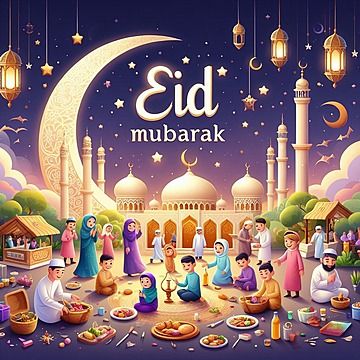
Celebrating Eid: A Festival of Faith, Community, and Joy
Eid al-Fitr, often simply known as Eid, is one of the most significant and joyous occasions for Muslims around the world. Marking the end of Ramadan, the holy month of fasting, Eid is a time for reflection, gratitude, and celebration. In this blog, we’ll delve into the significance of Eid, its traditions, and how it brings communities together.
The Significance of Eid al-Fitr
Eid al-Fitr, which translates to “Festival of Breaking the Fast,” is celebrated on the first day of Shawwal, the month following Ramadan. This day holds deep spiritual significance as it symbolizes the completion of a month of fasting, prayer, and self-discipline. It is a time for Muslims to express gratitude for the strength and blessings received during Ramadan, as well as to seek forgiveness and renewal.
Traditions and Customs
1. The Eid Prayer
The day begins with the special Eid prayer, which is usually held in large congregations at mosques or open fields. These prayers are an opportunity for the community to come together in worship and reflection. The sermon that follows emphasizes charity, gratitude, and the importance of unity.
2. Zakat al-Fitr
One of the core tenets of Eid is giving. Before the Eid prayer, Muslims are required to give Zakat al-Fitr, a form of charity meant to purify those who fast and to provide for those in need. This ensures that everyone, regardless of their financial situation, can partake in the festivities.
3. Feasting and Festivities
Food plays a central role in Eid celebrations. Families prepare special dishes, often showcasing their cultural heritage. Traditional foods vary from region to region, but some favorites include biryani, kebabs, sweets like baklava and sheer khurma, and an array of delicious snacks. Sharing meals with family and friends fosters a sense of community and belonging.
4. New Clothes and Gifts
Eid is also a time for dressing up. Many people wear new or their best clothes, symbolizing renewal and celebration. Exchanging gifts, especially for children, is a cherished custom which further enhancing the festive spirit.
5. Visiting Family and Friends
Additionally, the day is marked by visiting relatives and friends. This practice not only strengthens bonds, promotes harmony, but also ensures that everyone shares in the joy of the occasion. Many also take the time to visit the graves of loved ones, offering prayers and remembrance.
A Time for Reflection and Gratitude
Eid is not only about celebration but also about reflection. Additionally, after a month of fasting and spiritual growth, this festival encourages individuals to appreciate the blessings in their lives. It serves as a reminder to carry the lessons learned during Ramadan—compassion, generosity, and self-discipline—into everyday life.
Conclusion
Eid al-Fitr is a beautiful celebration of faith, community, and love. It also transcends geographical and cultural boundaries, uniting Muslims worldwide in a spirit of joy and gratitude. As we gather with loved ones, share delicious meals, and extend our hands in charity, let us embrace the true essence of Eid: compassion, unity, and the pursuit of peace.
May this Eid bring happiness, prosperity, and blessings to you and your family. Eid Mubarak!
